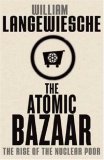I came upon the work of journalist William Langweische in pre-Internet times, reading a faded and dog-eared photocopy of "The World In Its Extreme," a series of Atlantic Monthly articles that trace his travels across the Sahara desert. A vivid scene leaps to my whenever I'm in an airplane: He is on his way to a remote Sahara outpust, flying at a low altitude above the sweltering desert in a rickety old plane and surveying an endless expanse of what appears to be nothingness. I think of this as I pass over (my homeland) the Midwest. Like the Midwest, he finds that it's only mostly nothingness, that there are actual inhabitants and real-life oases, and his accounts of the people, places and cultures are really riveting. (He expanded this piece in a book called Sahara Unveiled). Langewiesche's new book, The Atomic Bazaar, was the cover story of this week's NYT Book Review. I have no doubt that it will be great, even though the topic is one that I'd almost prefer to think about less: The circumstances under which a group of terrorists could acquire highly enriched uranium and then build a bomb. If you listen to these NPR interviews with him (part one; part two), you get the sense that it's a lot easier than it should be, but that the likelihood is still there. Now that the book is out there, I know I have to read it.
Joshua Ferris, Then We Came to the End
Early this week, I plowed through Then We Came to the End, the debut novel of Joshua Ferris. It's a book about office life at ad firm in the early 2000's, specifically about how the fat, happy days of the late 90's give way to the slow, scary days of the early 2000's. In a nutshell, reality crashes into the fairytale; normalcy is shattered; there are efforts to deny the inevitable; the inevitable happens; a new normalcy is eventually erected amidst the rubble. It's good, though: Lots of interesting, authentic characters, funny dialogue, a few geniunely moving moments. Geeks will appreciate that the novel is written in first-person plural omniscient, meaning that the story is told from the point of view of "we," but the identity of the "I" behind the "we" is never established. It works, I think. After 50 pages or so, I thought to myself: "Is he really going to keep this up for the whole book?" But Ferris never gets cutesy with it, and it effectively evokes a very office-like sense of disassociation, of total incorporation into the whole, of membership in a group that has completely assimilated the identities of its constituents.

